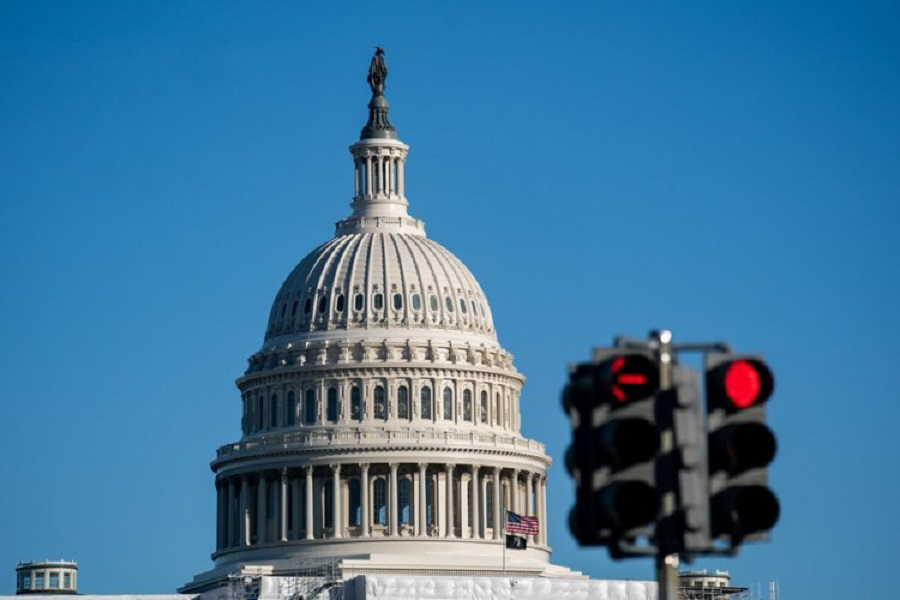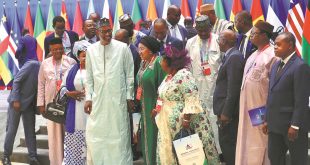Published: July 26,2024
By Guo Jiulin and Wang Yizhen

The US Capitol building is seen in Washington, DC, on Nov 8,2022. [Photo/Xinhua]
American scholars Michael Robbins, Amaney A. Jamal and Mark Tessler published a joint article in Foreign Affairs analyzing that October 7, 2023, may become a watershed for the United States. The Gaza war, which tragically claimed the lives of 37,626 Palestinians and left 86,098 others injured, has catalyzed a significant shift in the Arab public’s perception of the United States. The three American scholars believe the United States is losing the Arab world, while China is reaping the benefits.
Their analysis, based on data from the Arab Barometer, underscores this transformative trend. Through surveys conducted across five countries in late 2023 and early 2024, they observed a stark decrease in Arab citizens’ favorable views of the United States, juxtaposed with a warming sentiment towards China. Moreover, a pre-and post-October 7 polls in Tunisia strongly indicates that this shift in sentiment was a direct response to the events unfolding in Gaza. The scholars emphasize that Arab discontent with the United States appears to be the driving force behind this shift, rather than explicit support for China’s stance on Gaza.
Although the three scholars cite a variety of data to support their views, some of the analysis exhibit a clear Western bias and lack persuasiveness. For example, when asked whether US or Chinese policies are more conducive to security in the Arab world, a significant number of respondents expressed a preference for China’s approach. Despite this, the scholars counter by highlighting that China’s actual presence in the region is minimal, and its engagement is mainly focused on economic deals facilitated by the Belt and Road Initiative.
Obviously, their argument doesn’t hold water. From the ancient Silk Road to the Belt and Road Initiative, China and Arab countries have maintained a symbiotic relationship, striving for mutual benefit and win-win outcome. The two parties have actively engaged in substantive cooperation across various sectors including economy, trade, energy, infrastructure construction, agriculture and high technology, yielding fruitful results. In addition, China has played a pivotal role in fostering historic reconciliation between Saudi Arabia and Iran, advocating for Syria’s reinstatement in the Arab League, and supporting Arab countries in strengthening their strategic autonomy. On the issue of the Palestinian-Israeli conflict, China has consistently provided humanitarian aid to the Palestinians and dispatched special envoys to advocate for ceasefire negotiations. Thus, China’s presence in the Arab world demands recognition and cannot be disregarded.
What is particularly striking is their assertion that the Arab populace’s preference for China is solely result of their discontent with the United States-a viewpoint that is biased and speculative. In fact, their shift in attitudes towards China and the United States stems from the very different approaches of the two countries, with China notably exerting a positive impact. As a Chinese saying goes, “A just cause enjoys abundant support while an unjust one finds little support,” it is evident that China’s actions have resonated positively in the region. The three scholars’ attempts to downplay China’s contribution to the region aims to underscore the US influence and sow discord in China’s relations with the Arab world by distorting cause and effect. They depict China as reaping the spoils of victory without lifting a finger, which not only reveals the United States’ apprehension towards the growing Arab affinity for China, but also underscores its strategic agenda to contain China. This narrative also exposes the West’s ignorance and prejudice towards China.
It is the limitations of the Western perspective that hinder a comprehensive understanding of the nuanced factors driving the Arab world’s evolving sentiments towards the United States. In the article, the scholars attribute the US diminishing standing in the Arab world primarily to its divergent policies concerning Israel and the Gaza conflict, overlooking broader contributing elements. While acknowledging the significant impact of the US mishandling of the Israeli-Palestinian discord, this perspective merely scratches the surface, warranting a more profound examination across historical timelines and Arab-centric viewpoints.
First and foremost, this is a historic choice for the Arab people. Twenty years ago, the United States pledged to liberate and foster a united, stable and free Iraq, yet Baghdad was eventually turned into a “ghost town” under the American invasion. Nowadays, despite the avowing commitment to resolving the Israeli-Palestinian conflict, the US continues to arm Israel with offensive weapons and equipment-a disheartening echo of past actions. For a long time, the United States has tried to exert its influence on the Middle East through military interventions and economic sanctions, but its actions have often triggered regional conflicts and even led to the outbreak of wars, posing a threat to the peace and security of the region. The recurring hegemonic conduct of the United States has left the Arab people feeling incensed and disillusioned. After long-term observation and judgment, the Arab people have already seen through the real intention of the United States.
From the perspective of the Arab world, this may be a manifestation of the region’s pursuit of strategic autonomy. After the Cold War, the United States interfered brazenly in Arab nations’ internal affairs to safeguard its own interests, and even advocated for regime change through forceful tactics like armed invasions, and the imposition of a contrived “American-style democracy”. This is reminiscent of historical instances such as Britain’s imposition of a hierarchical system and the “divide and rule” policy in India to perpetuate its dominion. Undoubtedly, such interventions by the United States and the United Kingdom have caused irreparable harm and losses to the local people. With the development of globalization and information technology, the Arab world is undergoing unprecedented transformation. Some Arab countries have begun to seek political pluralism and economic autonomy in an attempt to break away from the control of external forces such as the United States. This change has not only had a profound impact on the relationship between the United States and the Arab world, but on the political landscape of the entire Middle East region as well.
In contrast to the US approach, China has emerged as an active participant in the peace-building endeavors in the Middle East, steadfastly upholding principles of mutual respect for sovereignty and territorial integrity, non-interference in internal affairs, equality and mutual benefit, and peaceful coexistence. In its cooperation with the Arab world, China prioritizes bolstering the autonomy of the Middle Eastern countries and advocates for self-driven stability, aiming to foster enduring peace and prosperity in the region. This approach has engendered growing trust and admiration among the Arab people towards China. The recent signing of the Beijing Declaration stands as the best example of the trust. The declaration encapsulates the aspirations of the 14 Palestinian factions for peace and improved livelihoods, underscoring their deep confidence in the Chinese government’s commitment to the well-being of individuals in the Arab world.
Echoing the sentiments of the three American scholars, the current situation represents both danger and opportunity for the United States. It is imperative for the United States to actively engage in resolving the Gaza conflict, kick-start negotiations for a permanent solution to the Palestinian-Israeli discord, and work with the international community to foster a peaceful and stable future for the Middle East region. Meanwhile, the United States should re-examine its foreign policy and strategies in the Middle East, abandon the mindset of Western hegemony, respect the autonomy of the Arab world, and prioritize cooperation and dialogue with Arab countries in order to realize a mutually beneficial and win-win situation.
Guo Jiulin is a professor of American studies at Dalian Minzu University and Wang Yizhen is a senior student of Chinese Literature and Language at the same university.
chinadaily.com.cn
 Africa -China Review Africa -China Cooperation and Transformation
Africa -China Review Africa -China Cooperation and Transformation
